
Dragon's Dogma 2 Review
It didn't take long for it to set in that Dragon's Dogma 2 is a very special game. Even as someone ready and willing to embrace what the sequel had in store for me, after experiencing and loving the first game for what it was - there's always been the sense that the 2012 original was just a few steps removed from the RPG it could've been. Having completed Dragon's Dogma 2, there's no hesitation in stating as much now; Capcom and Hideaki Itsuno have fully realized the promise of that original release from over a decade ago, and the result is an RPG that I feel confident will stand the test of time.
But where to begin? At first glance, you'd be forgiven for failing to parse exactly what makes Dragon's Dogma 2 succeed where its predecessor might have failed - though calling Dragon's Dogma 1 a "failure" feels derogatory. For all its faults, there's a reason why the game has garnered so many fans, as well as why the allure of a follow-up had gained so much fervor behind it. Even now, the game feels like a fascinating take on the genre, that blazes its own path forward, despite its myriad inspirations. It's a series wholly uninterested in beating to anyone else's drum, such as with its deliberately restrictive fast travel system, and continued reliance on the NPC-controlled Pawn system. The goal of Dragon's Dogma is to get the player immersed in a world, and in turn, consider what they're fighting for as the Arisen. To share in the experience of everyone else inhabiting that world at the same time, and to share their knowledge and experiences through their pawns so that everyone can learn more of this world together.
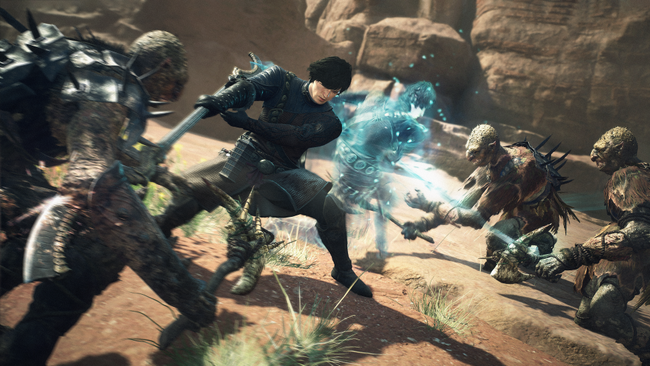
And learn you shall; there were many moments that struck me with how immersive Dragon's Dogma 2's world can be, but the one that stands to mind the most is riding a ropeway, Pawn operating the machine as I'm left to my own devices to scan the Battahl horizon. A shadow of a Griffin passes over my character, yet when I turn to face it I learn that I'm not in imminent danger - but rather, the shadow was cast from the monster that must've been miles away in the distance. Below me, goblins engage with a Golem; one of its attacks misses its mark and ends up embedded in a rock face further along my path - the residual heat from the blast subsiding as I pass overhead. Meanwhile, two cyclops battle each other for dominance; oblivious to the struggles taking place around them.
Even when described, it feels impossible to properly convey the scale of Dragon's Dogma 2's world without experiencing it for yourself. Yet, Dragon's Dogma still persists in being a game about stories; of encounters, of ambushes late at night, at clutching victory from the jaws of defeat. Now more than ever Dragon's Dogma's world accommodates these stories, only enhanced by the exploration offered by the dense, expanded world; dotted with all manner of caves, shrines, and dungeons to uncover. Crucially, it feels that there's always a reason to explore whatever might be on your horizon, as there's a sense that you'll never truly know what could be waiting on the other side.
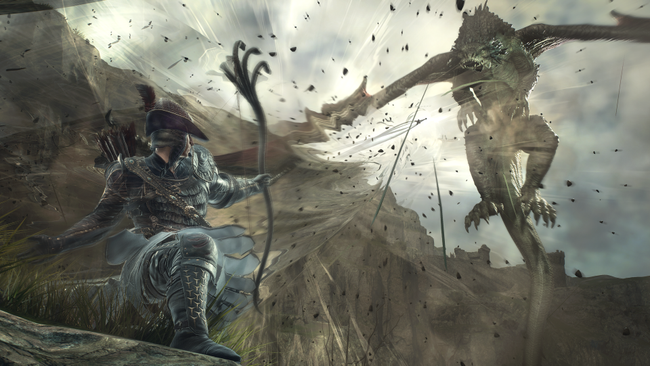
At times, this can mean the player quite literally losing their way; much like the original, night can be an unforgiving affair. Dragon's Dogma 2's world is dense, yes, but that also means that night feels even more treacherous than ever before. Even in broad daylight, enemies might hide themselves in the shade of trees, ready to pounce on you if caught unaware - others might cling to the ceiling of a cave, ready to drop down from above. While it is all well and good for players to explore off the beaten path, there's a real expectation that players have a goal in mind when out exploring the world - or, failing that, to be properly prepared for whatever might await them - even if "prepared" might be a means of escape. Returning to the roots of the original release, there is no such thing as an "Eternal Ferrystone", and purchasing the single-use stones for yourself is expensive. You can receive them as rewards for sidequests, and find them dotted across the world - but they're a resource best saved for when you truly need to use them.
While the original Dragon's Dogma had time-sensitive quests, tensions have been ratcheted up a notch with the sequel. No longer is quest progress tied to story progress, but when a quest is timed, there's a priority that you complete it as fast as possible. Dragon's Dogma 2's world will continue on without you; so be careful who you talk to, as you never might know what you might be setting yourself up for. Even for events that aren't added to your quest log, the consequences for your actions can be far wider reaching than you might realize; and the game very much expects you to stop and think about the world around you, and how it might change based on your actions. Time is very much a premium; and while oxcarts offer a cheap means of travel, they only run at specific times of day, and of course take time to travel across the world - all the while running the risk of being raided en route to your destination.
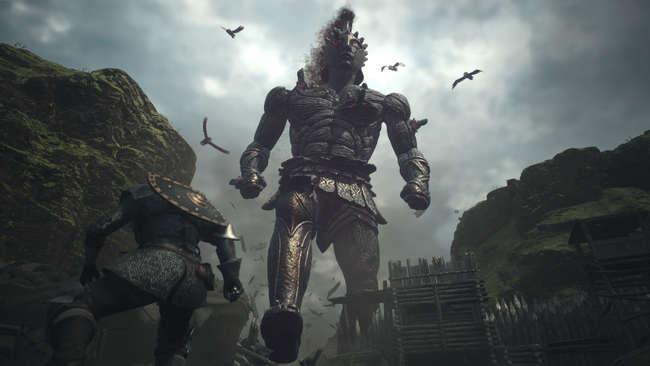
Yet for every risk that Dragon's Dogma 2's world offers, there's an equal reward. Guiding statues that dot the environment point to landmarks, many of which offer unique experiences. Special vocations, like the Mystic Spearhand and the Magick Archer require players to seek them out themselves; the world is dotted with paths that might lead to a location far before the game's story might take you there, not to mention the countless locations completely optional to explore. Much ado has been made about the game's Sphinx, and her riddles - and indeed she lives up to her namesake, offering challenges that befit the legend surrounding her.
However, it's not just the Sphinx's riddles that might vex the player's mind. While the original toyed with quests that offered unique rewards depending on how you chose to complete them, many sidequest chains in Dragon's Dogma 2 can drastically diverge depending on your choices - not to mention the types of quests that players might face are significantly more varied this time around. It's not always just combat players will be tasked with, and yet every quest ends up feeling meaningful in its own way. I'd even go as far as to say that Dragon's Dogma 2's quest design, how it interacts with the world and how it respects player autonomy, makes the game feel akin to a CRPG - when playing the game, it's striking just how much your intelligence is respected. How you're rewarded for paying careful attention to the world around you, while at the same time punished for making careless decisions.
Strikingly, many of these sidequests seamlessly blend into the main story; your actions inform the main narrative in surprising ways. Fail to protect one character, and they might find themselves absent from the story entirely; it's not like the game's narrative will completely unravel depending on your actions, but the permutations run surprisingly deep, all told - and the additional context that some side quests provide is well worth pursuing. You never know who or what might come back in quest down the line... even taken on its own, Dragon's Dogma 2's story feels better integrated with its world as a whole, and far more intriguing from the get-go.
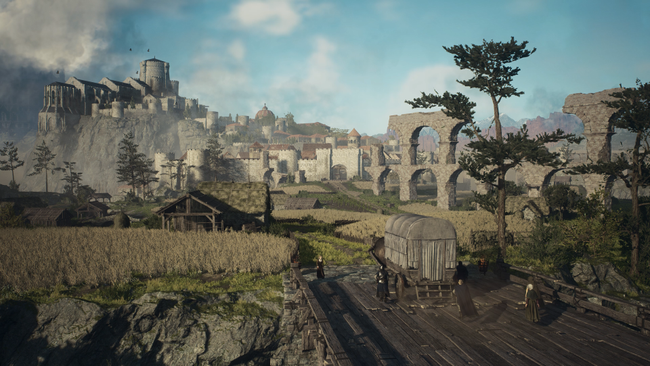
While it might end up being a controversial change to some, the idea to lock many of the game's Vocations behind sidequests feels like a bold declaration of the type of RPG that Dragon's Dogma 2 aspires to be, and has succeeded in delivering. Both new and returning vocations greatly differ from those that came before, and at the same time, there's a real benefit to players exploring them all. Mystic Spearhand offers great burst damage, while at the same time allowing players to react and support their pawns, to help turn the tide of battle; while the retooled Archer and Thief justify their existence, separate from Strider from the first game.
As players use a vocation and rank it up, not only will they unlock skills that they can purchase at a Vocations Guild to equip, but also augments that can be equipped to any of your Vocations once acquired; think of it like a traditional Final Fantasy job system, in that sense. The same, of course, can also apply to your Main Pawn; although they're limited in what Vocations they'll be able to equip, with the likes of Trickster, Mystic Spearhand, Magick Archer, and Warfarer remaining exclusive to the Arisen. Augments, combined with unique stat growths for enhancing equipment depending on the style of blacksmith you choose offer a real depth to character building. Making use of an Elven Forge prioritizes magic damage, so maybe you'll want to seek one out when looking to enhance a staff or magic bow; though for melee weapons Battahl's style of blacksmithing may make the most sense. Or maybe you'll want to mix and match, as the needs arise?
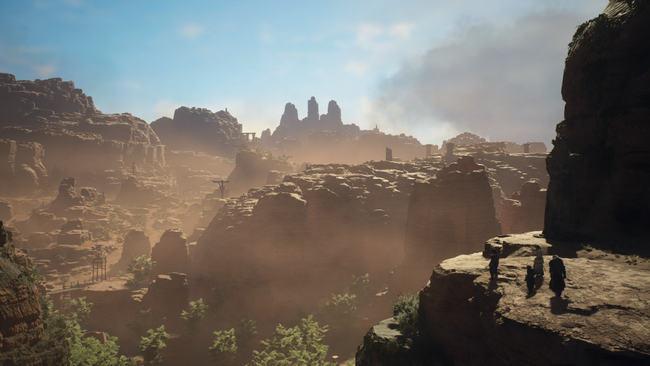
The depth to Dragon's Dogma 2's world feels staggering. It truly feels like there's always something unexpected waiting around every corner, and it can't be stressed enough just how gorgeous this game is to behold. Watching the foliage of a forest react to the beating wings of a Griffin, light and shadow dancing through the leaves with the wind; or the glint of a sorcery illuminating your surroundings in a pitch-black cave, with only that and your lanterns to guide you through the dark. Maxed out on PC, Dragon's Dogma 2 is easily one of the most visually impressive games I've played - though that does come at a hefty performance cost.
For all the simulations that Dragon's Dogma 2 does on a regular basis, it shouldn't come as a great surprise that the game can and will absolutely hammer the CPU. Inside Vernworth, the game's first major city, there currently isn't a PC you can build that won't have regular dips below 60 FPS. On my desktop with an RTX 4090, 64GB of RAM and a Ryzen 7 7700x I had dips down to 50 FPS at times; while other towns and even cities don't dip as heavily, it still bears mentioning that Dragon's Dogma 2 is a very heavy game to run, and most players should temper their expectations heading in. I can only say that I feel, based on what the game delivers in terms of systems and gameplay that the performance is justified - but don't expect to be playing this on a Steam Deck anytime soon. In fact, if your system is anything more than a few years old, prepare to play the game at 30 FPS.
Even then, Dragon's Dogma 2 is an absolute triumph in nearly every sense of the word. There's so much more I could share about my playthrough, but this is a game best worth experiencing blind - letting your own actions dictate the story you tell. So, immerse yourself; "learn aught of this world you must protect". Dragon's Dogma 2 is a bold and brave leap forward for RPGs, inviting you to come along for an unforgettable journey that will be uniquely yours. All that awaits is that very first step.